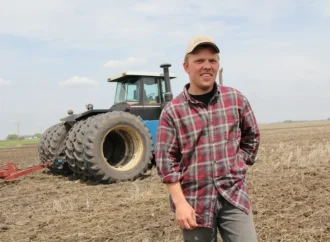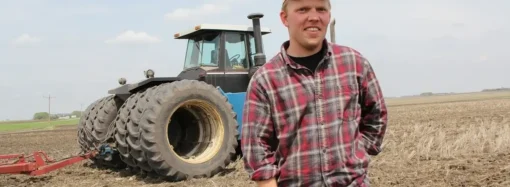“Do you work or do you just stay home?”
Many mothers have answered this loaded question. It presents, of course, a false dilemma, but one that exemplifies the way our culture thinks about the home and work itself.
As summer approaches, my husband and I are spending most of our Saturdays outdoors doing hard manual labor on our homestead. Yet for both of us, these Saturdays are our favorite part of the week and restful in a way. Yes, we both labor the other days of the week, but this is different. It feels more natural, more harmonious.
In a “traditional” modern family structure – if by traditional we mean the dominant family dynamic in the post-industrial revolution era – the woman stays home and the man makes the money, which she then spends on caring for her children, herself, her husband, and her home. In such a system, work is identified as, first, what one does for a paycheck, and second, something done outside the home, but for the sake of the home.
The online popularity of Hannah Neeleman, better known by her social media handle “Ballerina Farm,” who owns a dairy farm in the mountains of Utah, is an example of how our culture is kicking against this mindset. Many accuse Neeleman and her family of promoting a vision of family life that few can hope to attain. But whatever her intentions with her account, her lifestyle is popular for a reason. She, her children, and her husband are all united in a common endeavor that feeds and clothes their family, even if that endeavor includes social media reels and selling candles as well as milking cows and kneading sourdough.
Baking, butchering chickens, making yogurt, raising meat, planting gardens are all skills only a select few need anymore. Yet people are learning these skills, and not just because of social media trends or fear about a coming apocalyptic food shortage. Even the prairie dresses, often derided as oppressive and ludicrous, are more than cosplay – they hearken to a time when femininity was an asset in the economy, rather than a quaint anachronism. Young homesteaders sense that something isn’t right about modern families – children away at school, mom and dad each at their respective places of employment, coming together for a few hours every night, just to do it all over again to make the money that they will all spend apart.
Because of the way our economic system is set up, women who choose to “stay home” find themselves defending what many see as a soft and easy existence. Some consider them lucky, others consider them lazy. In my experience, stay-at-home moms are usually told that they are “doing the hardest job in the world.” People who say this are trying to be encouraging, but they do so by defining a mother’s vocation via the social currency of our modern economic system – jobs and employers and paychecks and status. Being a stay-at-home mom, then, is defined by its most charitable supporters as a job with little children as employers that’s done for no paycheck except the loving and grateful hearts of your children.
My own answer to the dreaded question of “do you work” has never been an easy one since I got pregnant. My “work,” as defined by something I do for an outside employer, is less than part time and often inconsistent. These days, I find myself explaining that even though I “just stay home” I also “work,” surprising myself in my own desperation to prove my bona fides in our modern economic structure.
The online movement to homestead should make us hopeful that we can return to productive family economies where gender roles seem more natural than legalistic. Homesteading is a revival of the family economy. It is unlikely that we will return to an agrarian society again, nor is it fruitful to pine for a system that had its own devastating challenges – obviously, I am not wishing that my husband and I will lose half our children to an avoidable disease.
It can be easy to dismiss online trends as fads, but the online movement to homestead appears more lasting than that. It is based on a natural desire to have a family economy that represents a mutual effort between man and woman or adult and child to build and nurture a home. There’s something about a son feeding and watering a chicken that the dad butchers and the mom cooks that’s about more than aesthetic farmhouse photos on Instagram. It’s about each member of the family having a direct stake in the economic collaboration of home life.
—
The republication of this article is made possible by The Fred & Rheta Skelton Center for Cultural Renewal.
Image Credit: Hannah Neeleman a.k.a. Ballerina Farm (Instagram still)
24 comments















24 Comments
Roryrichardson
April 22, 2025, 2:59 pmAs a victim of a scam, I was impressed by the exceptional service provided by Cyberspace Hack Pro. Their team demonstrated expertise and dedication to recovering my lost funds.
– Professional and efficient service
– Expertise in tracking down scammers and retrieving funds
– Dedicated to customer satisfaction
I highly recommend Cyberspace Hack Pro to individuals who have fallen victim to scams. Their services are reliable, trustworthy, and effective.
REPLYContact info
https://cyberspacehackpro0.wixsite.com/cyberspacehackpro
Email: Cyberspacehackpro@rescueteam com
WhatsApp +1 (559) 508 2403
Jhon@Roryrichardson
April 23, 2025, 1:04 pmEarn $1800+ Weekly from Home! A few months ago, I was stuck in a routine, barely making ends meet. Now, I earn $205+ a day working from home with complete flexibility! No experience? No problem. This is a real opportunity to build financial freedom on your terms.
Join now➤➤ http://www.Jobs67.com
REPLYDebbie W.@Jhon
April 24, 2025, 12:18 pmFind Online Jobs (8000$-95000$ Weekly) safe and secure! Easy Acces To Information. Simple in use. All the Answers. Multiple sources combined. Fast and trusted. Discover us now! Easy & Fast, 99% Match…..
REPLY.
More Details For Us →→→→ https://tinyurl.com/46fjveeh
eva
April 22, 2025, 4:08 pmI get paid more than 💵$100 to 💵$500 per hour for working online. I heard about this job 3 months ago and after joining this I have earned easily 💵$20k from this without having online working skills . Simply give it a shot on the accompanying site…
REPLYHere is I started.…………>> http://Www.HighProfit1.Com
Eula S. Wehr
April 24, 2025, 9:31 amI get paid over $220 per hour working from home with 2 kids at home. I never thought I would be able to do it but my best friend earns over $35k a month doing this and she convinced me to try.
It was all true and has totally changed my life…. https://salaryhere.com/
REPLYAndreaHanson
April 25, 2025, 8:39 amI get paid more than $100 to $500 per hour for working online. I heard about this job 3 months ago and after joining this I have earned easily $20k from this without having online working skills . Simply give it a shot on the accompanying site…
REPLYHere is I started.…………>> https://Www.Earn54.Com
Gillian Bayford
April 25, 2025, 11:53 amI want to use this medium to share my incredible manifesting with Dr. Kachi, who truly changed my life. For a long time, I struggled with homelessness after losing my job as a nurse. Life felt like an endless battle, and I spent many years trying to win the lottery, hoping for a better future. But despite my efforts, I had no success and was growing increasingly frustrated. That was until I came across an amazing testimony from a woman named Natasha, who shared how Dr. Kachi helped her win the National EuroMillions jackpot. I had always loved playing EuroMillions, but winning seemed impossible for me. However, after seeing Natasha's story, I decided to reach out to Dr. Kachi prepared a special spell to help me with guaranteed lucky numbers. Within 24 hours, he provided me with the winning numbers and instructed me to play. To my amazement, I won £184.656 million in the EuroMillions! Thanks to Dr. Kachi, my life has been transformed, and my financial situation has changed for the better. I will never forget this joyful moment, as it has been the best thing to ever happen to me. If you’re struggling and seeking a way out, never give up. Dr. Kachi can help you, just as he helped me. Keep your faith and take a chance – your life could change too! contact his email [email protected] or his phone text or call number: +1 (209) 893-8075
REPLY